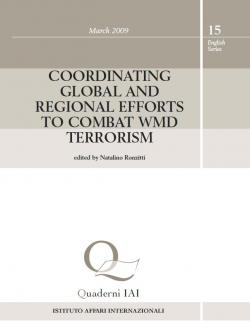Coordinating Global and Regional Efforts to Combat WMD Terrorism
WMD terrorism has become a real threat. Even the probability of terrorist organizations using fissile material to build a crude nuclear device is realistic. This publication looks at national and international efforts aimed at curbing WMD terrorism. It examines the different policies worked out by the international community: unilateral and multilateral initiatives, coalitions of the willing and the role of international organizations, both universal, such as the United Nations and the IAEA, and regional, such as NATO and the EU. Unilateralism and ad hoc coalitions are seen as a means for complementing multilateralism and the work done by international organizations. Numerous policies have been devised and several actions carried out. This notwithstanding, international terrorism is still a threat, and a consensual policy remains difficult to achieve because of the North-South division on defining international terrorism, the main cause for the abortive attempt to draft a global convention. This publication is a follow-up to the conference on "Coordinating Global and Regional Efforts to Combat WMD Terrorism", held in Rome on October 24, 2008. It is not a mere collection of papers, but provides thorough insight into the WMD terrorism phenomenon and can help to define further lines of action.
Chapters 1-3 published also in The International Spectator, Vol. 44, No. 1 (March 2009).
-
Details
Roma, Istituto Affari Internazionali, March 2009, 189 p. -
Issue
15 -
ISBN/ISSN/DOI:
978-88-98042-69-2 (online)
Preface, Natalino Ronzitti
List of Acronyms
1. The global challenge of WMD terrorism: evaluating the threat and US-led multilateral responses, Eric Rosand
2. The G8 and the fight against nuclear proliferation: proposals and legal limitations, Masahiko Asada
3. The Global Initiative and other multilateral initiatives and partnerships against nuclear terrorism, Riccardo Alcaro, Nicoletta Pirozzi, Natalino Ronzitti
4. Transatlantic cooperation on the threat of WMD terrorism, Jean-François Daguzan
5. Fighting off fatigue: the U.N. cornerstone of antiterrorism action, Jeffrey Laurenti
6. Fighting against WMD terrorism: what role for the EU?, Giorgio Franceschini
Conference report, Mirko Sossai
Conference agenda
Topic
Tag
Related content
-
Publication17/08/2015
The Global Initiative to Combat Nuclear Terrorism
leggi tutto -
Publication17/08/2015
Combating WMD Terrorism
leggi tutto -
Publication17/08/2015
Strengthening the Nuclear Non-Proliferation Regime
leggi tutto



